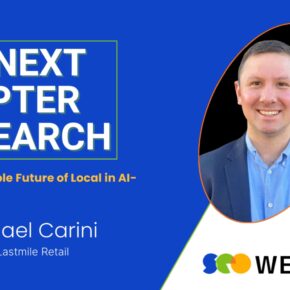
About Phil Nottingham
Phil Nottingham is the founder of Organic Video and consults on video strategy, production, and distribution. He began his career in technical theatre and film production, then entered the marketing world in 2010. A renowned expert in Video SEO, YouTube marketing, and brand strategy, he has produced content that has generated millions of views for multiple businesses.
Phil's SEO Week Session
- Title: YouTube Keyword Research 2.0
- When to Watch: Day 3 | Wednesday, Apr 30th | 11:15 am
- Session Abstract: Most YouTube keyword research is broken—trying to force Google SEO methods onto a completely different platform. Phil Nottingham will introduce a smarter, data-backed way to identify video topics that actually generate views.
- Why most third-party “YouTube search volume” data is misleading
- How to research video ideas based on format, competition, and audience intent
- A practical framework for planning videos that drive real engagement
Transcript
Garrett: All right, welcome back to The Next Chapter of Search produced by SEO Week and iPullRank. If you haven’t already got tickets, we are going to be in New York City, April 28th through May 2nd. It is going to be unbelievable, 35+ amazing speakers, experts in the industry. We’re talking AI, content, SEO, and video. Speaking of which, I am joined today by none other than Phil Nottingham. He is the founder and producer at Organic Video. How you doing today, Phil? What’s going on, man?
Phil: Very well, Garrett, thank you. Yep, all good.
Garrett: I am so excited to learn all about what you are going to be presenting. Video, obviously, has a place in my heart. I put way too much effort into my background and video efforts here. So, starting off, let’s dive in. Where are we in the state of SEO in general and specifically in the context of video from your perspective?
Phil: Yeah, so I guess SEO more broadly, I guess we’re in kind of just a state of flux where there’s just a lot of change and a lot of movement towards thinking about things differently. So, I mean, I guess this has been true for a long time, but I’m seeing it more acutely now where so much of what companies are doing is kind of anchored in an existence that was 10, maybe even nearly 20 years old now. And the reality of search and the complexities of just like how you think about what even a page is, like thinking about things in terms of entities, thinking about content as broader than the website and thinking of like this whole sort of holistic world in which you have to start sort of creating and optimizing for, as being so far removed from come up with a list of keywords and make pages that target the keywords, that it is just remarkable how kind of things have shifted. And yeah, I just don’t think the mentality is there.
So, we’re in this state of flux that seems to be moving so fast that people can’t keep up with it. And with video, it’s sort of, I suppose we’re in an interesting moment where I think from a search standpoint, it’s like video is just integral to search now. It’s just, it’s part of YouTube and even TikTok ranking in search results. You’re getting YouTube stuff pulled through in a bunch of the AI search results with Gemini and all that kind of thing. So, it’s just like part of the mix and yet still very few people are really doing it. Or they’re not thinking about it in those terms. They’re not thinking of video as a search tool. They’re thinking of it as primarily a tool for social media and maybe secondarily a tool for things like marketing automation, lead gen, that kind of stuff. So it’s just, I think as a tool for acquisition, the world of search and video in relation to that, it’s sort of, it’s a new space and it’s a space that I’m spending a lot of time working in, but it’s remarkable with the work that I’m doing, how much it’s just inculcating a whole new mindset of what video can do to like harness and improve your search efforts.
And some of the simple stuff there is just like thinking about part of your content research, your keyword research as having a video component to it and then starting to plan for that with your content strategy and where your video lives across website, search, social media, email. Because really video to work well is kind of integral for all these platforms.
On the like video specifically, maybe like that’s quite broad and a more granular thing, two things that I’d flag for the world of video right now. One is like last year, Google changed the way they sort of interpret pages and the way in which they will allow for certain pages to have a video result. And basically, they shifted a great deal to now only reward pages that kind of look like a YouTube page. So, a simpler video page, they won’t, if a video is mixed media, if it has like a product page with a video on it, it’s not going to rank with video results. But if it is like an individual sort of video player page, like you might have on Netflix or whatever, that will rank. So, one of the actions from that is kind of make sure you have that sort of video library sort of ecosystem on the website. And I think that’s where, yeah, that should go. And I think that’s a good shout.
And then in terms of like the social side of video, I think the current big conversation is about basically short and long form and how it fits together. So obviously TikTok is sort of pioneered a format of short video that YouTube Shorts is increasingly having and the way in which that then interacts with stuff you might be creating for longer videos. There’s a real sort of, there’s certain kind of lengths that different types of videos kind of require and the way in which you need to think about it from a creative standpoint, it’s quite interesting.
So, for example, here we are doing a kind of podcast format. That’s pretty long form. But what we’ll probably find is off the back of this, there’s like clips that you might want to think about having as short form. And it’s then that whole structure of, okay, we have a longer form asset. We then need to work out a chop it up into clips. Those then go and serve as kind of shorts or subsequent videos. And then we have the long form video and they need to kind of relate together and fit in. And the YouTube infrastructure is kind of becoming better at handling that sort of, if you like relational hierarchy between different content assets. And I think most of our thinking is a little bit still isolated on singular content assets. So, there’s a lot of thinking to be done there, I think in terms of like the creative process for how you make something long, turn in something short equally. Make something short and then maybe there’s longer versions of it and how that all pieces together on the platform. So yeah, lots going on.
Garrett: Oh my goodness. And so good. And you gave us two really great actionable things out of that. One is having the library in the video, almost YouTube format for discoverability. And then the strategy around short term and long term. So that kind of leads right into your presentation, SEO Week. Why should people come and see you? Like, what are they going to learn?
Phil: Yeah, well, so I’m still kind of working out precisely what I’m going to talk about. So, I’m kind of refining the details there. But I think the main thing, the kind of crux of that talk that I’m going to give is around essentially codifying YouTube keyword researchers discipline. So, a lot of the tools out there that claim to YouTube keyword research, don’t do YouTube keyword research. They, I don’t know what they do. They just come up with numbers out of thin air. And if you think about the way YouTube works is it’s not really like a, it’s not just a search driven platform. Like part of it’s search driven, part of it’s just browsing, part of it’s recommendations, part of it’s about subscription. So, it’s a very multifaceted platform in that regard that kind of straddles search and social media and feeds and all the other different kind of discovery platforms that we’re used to dealing with.
And in order to sort of research what you need to make on that, you need to think a bit broader than just like search terms and discover kind of, okay, what’s hot? Where’s there opportunity? Where’s the market being slightly underserved? How do you kind of determine the key ideas that you should be investing in, the core topics? And so I’m going to kind of basically lay out how to do that with some tools and explain the sort of actual data that you need to start gathering to kind of actually do that kind of analysis and provide a kind of step-by-step approach to doing that. So yeah, that’s going to be where I’m going with this. It’s sort of trying to take what SEOs might be familiar with there’s sort of a broader content strategy research, keyword research type activity that they’re probably doing for their clients every month and really saying, “well, okay, how do you take that idea but apply it to YouTube effectively?”
Garrett: That is so incredibly valuable because when I think about it and the direction that SEO is going, where we’re moving away from singular keywords and thinking about entire like content gaps and topical authority and really having a breadth of content that covers everything that people are looking for, it kind of leads to my question of like, what’s the next chapter of search when it comes to video? Because the other aspect of it that I’m curious your take on is as Google and these tools are more effective at transcribing videos, understanding the audio and the video content and surfacing that in discovery of search, what do you think is going to happen going forward?
Phil: Yeah, I mean, I think it’s integral in a bunch of directions. So, one thing, an example of this that might be worth thinking about is suppose you’re doing a podcast interview like this, you’re going to naturally cover a whole bunch of topics. And probably when most people do that, they don’t kind of think about it in a keyword or topic sort of research-driven sense. But actually, if you do the work properly, you can kind of discover that there’s probably an outline that the market is telling you it wants to hear in terms of the stuff you’re going to talk about. And then those video assets that you’re going to create are going to start to get clipped out, naturally pulled out with the transcripts feeding into generative search and kind of ending up populating the different search ecosystem in a way that you possibly hadn’t predicted, because it’s not quite like creating an asset for a target topic.
So, it’s a lot broader than that, but you’re really just having to kind of anchor your understanding of what you want to be talking about based on what the market is asking for and what else it’s watching, what else it’s searching for. And just like the watch behaviors of audiences on YouTube will tell you a lot about what you should be making. And then you can feed that understanding back into your written content, into your website and all the rest of it. So, I think it’s just a very useful lens into kind of the world that can, yeah, feed into product marketing and broader SEO as well.
Garrett: And it’s so exciting. Thank you so much for your time. For anyone who hasn’t gotten your tickets and wants to learn from Phil, make sure that you get your ticket for SEO Week in New York at the end of April. It’s going to be unbelievable. Thanks for your time, Phil. I really appreciate it, man.
Phil: My pleasure, thank you.



